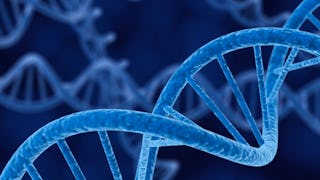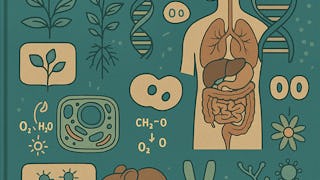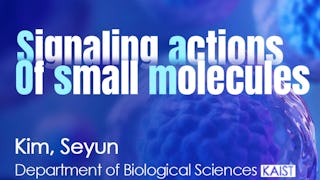In this course, we will explore the smaller side of biology: molecular biology. We’ll cover basic topics including cell biology and how cells can go “rogue” and turn into cancer, how energy from the sun is transferred to fuel our bodies, basics of genetics and inheritance, and genetic technologies. At the end of this course, we will discuss ethical and moral implications of several exciting and new genetic technologies.


The Little Stuff: Energy, Cells, and Genetics
This course is part of Biology Everywhere Specialization

Instructor: Melanie Peffer
10,773 already enrolled
Included with
(121 reviews)
What you'll learn
Explain how the body maintains control of cells and how loss of control can lead to cancer.
Describe how energy is passed through the biosphere and why (most) of life is dependent on the sun.
Explain the basics of genetics, including epigenetics, and how each relates to our phenotype.
Describe at least three different genetic technologies currently impact society and give pro and against arguments for each.
Skills you'll gain
Details to know

Add to your LinkedIn profile
See how employees at top companies are mastering in-demand skills

Build your subject-matter expertise
- Learn new concepts from industry experts
- Gain a foundational understanding of a subject or tool
- Develop job-relevant skills with hands-on projects
- Earn a shareable career certificate

There are 4 modules in this course
In this module, we will explore cell biology with particular attention to one application of cell biology: cancer.
What's included
3 videos2 readings2 peer reviews
In this module, we will discuss energy, including why the plants are the basis for (most) of life on earth. We will also examine how we can harness these fundamental biochemical reactions for making certain foods and beverages, such as bread and beer.
What's included
2 videos1 reading1 assignment1 peer review1 plugin
In this module, we will explore the basics of genetics, including a discussion of epigenetics.
What's included
3 videos2 readings1 assignment2 peer reviews
In this module, we will explore new genetic technologies, with a particular eye to the ethical and moral implications of these technologies.
What's included
4 videos4 readings1 peer review1 discussion prompt
Earn a career certificate
Add this credential to your LinkedIn profile, resume, or CV. Share it on social media and in your performance review.
Instructor

Offered by
Explore more from Basic Science
 Status: Free Trial
Status: Free TrialLecturio
 Status: Preview
Status: PreviewAmerican Museum of Natural History

Birla Institute of Technology & Science, Pilani
 Status: Preview
Status: PreviewKorea Advanced Institute of Science and Technology(KAIST)
Why people choose Coursera for their career




Learner reviews
121 reviews
- 5 stars
80.99%
- 4 stars
11.57%
- 3 stars
4.95%
- 2 stars
0.82%
- 1 star
1.65%
Showing 3 of 121
Reviewed on Mar 16, 2021
I have learned a lot from this course and I definitely recommend !!
Reviewed on Nov 25, 2020
I've learned everything at ease with the help of the videos, readings, and quizzes!
Reviewed on Dec 15, 2022
This course has helped me understand more about genetics and the certificate earned would help in the future when finding a job.

Open new doors with Coursera Plus
Unlimited access to 10,000+ world-class courses, hands-on projects, and job-ready certificate programs - all included in your subscription
Advance your career with an online degree
Earn a degree from world-class universities - 100% online
Join over 3,400 global companies that choose Coursera for Business
Upskill your employees to excel in the digital economy
Frequently asked questions
To access the course materials, assignments and to earn a Certificate, you will need to purchase the Certificate experience when you enroll in a course. You can try a Free Trial instead, or apply for Financial Aid. The course may offer 'Full Course, No Certificate' instead. This option lets you see all course materials, submit required assessments, and get a final grade. This also means that you will not be able to purchase a Certificate experience.
When you enroll in the course, you get access to all of the courses in the Specialization, and you earn a certificate when you complete the work. Your electronic Certificate will be added to your Accomplishments page - from there, you can print your Certificate or add it to your LinkedIn profile.
Yes. In select learning programs, you can apply for financial aid or a scholarship if you can’t afford the enrollment fee. If fin aid or scholarship is available for your learning program selection, you’ll find a link to apply on the description page.
More questions
Financial aid available,
¹ Some assignments in this course are AI-graded. For these assignments, your data will be used in accordance with Coursera's Privacy Notice.

